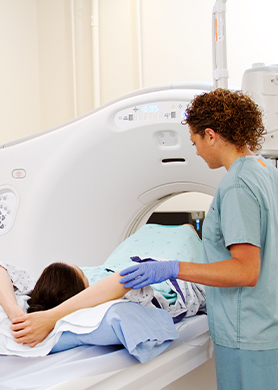In a career climate of increasing automation and an excess of job candidates with bachelor's degrees, how can you set yourself apart and find the right fit? More than half a trillion dollars is being spent each year to try and find the answer to that question, according to Forbes and there's still no obvious answer coming down from above.
While the scholars and executives are trying to work it all out, there are steps you can take to make it work for you. Vocational and career technical education, or CTE, shows serious promise for underemployed workers.
Vocational and trade school careers are on the rise -- the U.S. Bureau of Labor Statistics (BLS) reports that 11 of the 20 fastest growing occupations in the country fit into the CTE category -- and the right training can set you up to take advantage of the trend. Let's take some time to address a few of the big questions that potential trade school students might have:
- What are vocational careers? Definitions differ, but jobs that don't require a standard bachelor's degree for their entry-level positions are typically considered vocational.
- What careers will have the most job openings? Demand for health care jobs is rising especially quickly, but vocations across the board should see solid increases.
- Which are highest paying trade school careers? Vocational career salary can depend on a lot of factors, like the state where you live and the amount of experience you have on the job, but you'll see average pay figures listed along with our top careers.
- Which vocational careers are in high demand? Alternative energy jobs like solar panel installer and wind turbine technician are showing the strongest numbers, but demand is high for a vast range of trade school careers. You can learn all about it below.
The Bureau of Labor Statistics reports that 11 of the 20 fastest-growing occupations in the country fit into the vocational or CTE category.
Why Choose Vocational Careers?
If you're not sure yet why trade and vocational school careers can be a good option, here are a few quick explanations of the advantages that CTE can bring to your working life:
Benefits of Trade School
- Shorter programs. Even the highest paying trade school careers typically only require an associate degree for entry-level positions. Two years of full-time study are all it takes to earn most associate degrees, and nearly all postsecondary certificates can be completed in even less time.
- Hands-on learning. Training programs for CTE careers often include practical instruction sections where students can learn to apply their lessons in real-world situations.
- More job opportunities. Many vocational school careers may be partially accessible to workers without any college or trade school experience, but job opportunities and salaries tend to be significantly higher for candidates with specific formal training.
Advantages of CTE / Trade School Careers
- High job growth. According to the BLS, the average expected job growth between 2016 and 2026 is roughly 7 percent. Only the slowest-growing of our best trade and vocational careers had job growth projections around average, and more than a quarter of them are expected to grow 15 percent or more over the next several years.
- Strong salary numbers. The BLS reported a national average salary of $51,960 in 2018. Just six of our 25 best CTE careers reported mean annual pay within $10,000 of that figure, and five others showed salaries of over $100,000 per year at the 75th percentile.
- Using what you learn. Traditional university graduates often find themselves looking for work in fields that don't quite line up with the field in which they got their degree. There's generally a direct relationship between vocational school programs and the careers they train you for, so you'll likely end up taking very few unrelated courses.
It's also the case that trade school programs usually cost less than four-year university degrees. If you're not sure how to choose the right vocational school for your career, our list of the country's best vocational schools can give you an idea of what to look for.
Trade and vocational programs often skip the requirements to take courses unrelated to your career, meaning you only have to learn what's necessary for your job.
The 25 Best Trade Jobs or Careers
In order to determine which trade and vocational school careers could be called the best, we looked at BLS data on key variables like total employment, national projected job growth and average annual salary. We also included 75th percentile salary averages, to give a more well-rounded picture of possible earnings in a given career.
When the dust settled, we had a trade school careers list of 25 careers that require a two-year degree or less but bring strong salary and job outlook numbers to the table. Scroll through the list below to find vocational school career options that can turn your job search around, and read about our methodology.

1. Dental Hygienist
Dental hygienists assist dentists with important dental treatment tasks such as cleaning teeth and examining patients for signs of cavities, gingivitis and other tooth and gum diseases. They also provide patients with education and guidance about proper oral hygiene and operate dental x-ray equipment. State regulations determine the level of day-to-day supervision required by a licensed dentist.

These tech pros are responsible for the look, feel and function of websites and apps that connect to the internet. They sometimes also create and publish content for the sites and apps they design. Some Web pros, called front-end Web developers, specialize in creating the look of a product, while others, called back-end Web developers, specialize in building the behind-the-scenes technical framework.

3. Diagnostic Medical Sonographer/Ultrasound Technician
Diagnostic medical sonographers help physicians and other health care personnel diagnose medical conditions. They use special high-frequency sound equipment to create images of organs, tissues and other matter inside the body that doctors and nurses can then examine. Some sonographers have a specialty, like cardiac, pediatric or obstetric/gynecological sonography, while others may work in multiple settings.

Breathing is one of the most important functions of the human body, and respiratory therapists work hard to help people manage or overcome diseases and other conditions that make it hard to breathe. They work often with chronic respiratory conditions like asthma and emphysema, but they may also provide acute care to patients who have suffered traumas like near-drowning or cardiac arrest.

5. Computer Network Support Specialist
Also called network technical support specialists, computer network support specialists work to ensure that private and public computer networks run as smoothly as they can. Some network support specialists work directly with network users, either at their homes or in a workplace setting, and some provide hands-on support to physical computer networks when they break down or need updating.

Magnetic resonance imaging (MRI) technologists use special high-tech scanners to capture detailed images of the organs and tissues in a patient's body. Patients are first injected with non-toxic dyes to make the images more visible to doctors and nurses. They often conduct screening interviews with patients, and those with enough training may troubleshoot technical issues with the scanning equipment.

Radiologic technologists are medical imaging workers who use x-rays, computed tomography (CT) scans and other means to produce images of the body for diagnostic purposes. Since they work with radiation, which can be dangerous in inappropriate doses, safety procedures are a big part of the job. They may train on multiple imaging methods or specialize in a particular radiologic modality.

These vital first responders work to ensure that teams of firefighters can operate smoothly in the high-pressure environment of a structure fire or other emergency. Supervisory positions aren't typically available to candidates without several years of experience in the fire service, but it's possible to land these jobs by completing a firefighting training program and building a strong work history in the department.

Shipping tends to take place behind the scenes, but the workers who help carry goods across the oceans and waterways are an extremely important part of the everyday life we take for granted. Captains, mates and pilots of water vessels each perform slightly different duties, with the captain being the most senior officer with the greatest responsibility for the ship. If you're a retired Navy servicemember, you may not even need additional training for this career.

They say that the difference between poison and medicine is the dose, and radiation therapy careers take this idea to heart. Radiation therapists treat cancer and other diseases in patients by using machines such as linear accelerators to deliver carefully calculated amounts of radiation to an affected area of the body. Radiation therapists are often part of oncology teams and may work alongside nurses and physicians with special cancer training.

Also known as PTAs, physical therapist assistants work under the supervision of licensed physical therapists to assist with therapeutic activities such as exercise, massage and balance training. They are also responsible for observing patients before, during and after therapy and recording their findings in a report. Adaptability is valuable in this career, since you're likely to see a wide variety of illnesses and injuries.

Occupational therapy assistants work under the supervision of licensed occupational therapists to help patients develop, improve or recover a range of necessary life skills. Job duties vary from case to case and can include such specific tasks as teaching a disabled patient the right way to maneuver from a bed into a wheelchair or helping injured workers get back into the job market by learning how to work around lost motor skills.

Funeral service managers are essential to the operation of a funeral home. They typically handle the administrative side of the business, which includes tasks such as supervising staff, conducting marketing campaigns and managing cash flow and other company resources. These management jobs aren't typically available at the entry level, but the right training and a few years of experience can get you there.

Paralegals and legal assistants support lawyers and law firms by performing clerical, administrative and research tasks. They may organize information, research relevant facts and statutes, draft legal correspondences and file exhibits, briefs and appeals with the court or opposing legal team, among other responsibilities. A great deal of research and filing is done electronically, so tech literacy can be a big plus in this career.

The preparation and use of radioactive drugs requires great care and good training. Nuclear medicine technologists learn how to work with the sensitive materials of their profession and provide support to physicians and other health care personnel when nuclear medicine becomes a part of a treatment plan. They may also act as emergency responders in the aftermath of power plant disruptions and other nuclear disasters.

Inspecting, maintaining and repairing aircraft systems can allow you to stimulate your mind while working with your hands. Aircraft mechanics and service technicians diagnose problems in wings, brakes, engines, electrical systems and other components of commercial and private aircraft. They repair or replace defective components using a combination of hand tools and power tools, essentially like an auto mechanic for the sky.

Technicians are needed in all forms of engineering, from the highly common mechanical and electrical disciplines to the less conventional aerospace, manufacturing and industrial engineering fields. Those who fall into the "other" category are generally engineering technicians who work in the less conventional engineering disciplines, but they may also be generally skilled technicians who move from one type of engineering to another.

Often called HVAC/R technicians, these essential technical workers use their expertise to set up and maintain the systems that manage our indoor climates. Aside from installing and repairing climate control systems, HVAC/R technicians sometimes sell service contracts to their clients and clean or maintain the systems over time. Proper storage, use, conservation and recycling of controlled refrigerants is essential in this career.

Whether it's theater on Broadway, a Hollywood feature film, a Halloween creepshow or your everyday local news, makeup artists are a big part of the production. The range of productions and performances that a makeup artist might work on is vast, and the detailed skill it takes to choose the right approach and create the right look can come at a high premium in the industry.

The oil and gas industry is surging in the U.S., and geological and petroleum technicians provide valuable support to the scientists, engineers and executives searching for more natural resources to exploit. Some of these technicians specialize in field work, such as gathering samples and installing outdoor equipment, while others focus on conducting tests, recording data, making maps and other tasks performed in a lab.

Air traffic controllers might be the best example of high paying careers with little schooling. The mean annual wage reported by the BLS is more than double the national average. These vital professionals manage the flow of aircraft into and out of the airspace around an airport and serve as pilots' eyes in the sky during takeoff and landing procedures, among other duties. Many specialize in one type of air traffic control, such as approach and departure.

Cardiovascular technologists and technicians are medical imaging personnel who specialize in imaging the heart and lungs. They may work in non-invasive modalities like electrocardiogram (EKG) testing or focus on assisting physicians and surgeons during certain invasive cardiac procedures. High-tech equipment is often used in cardiovascular imaging procedures, so students who are comfortable with technology should take well to the training.

These technicians help electrical and electronics engineers with the complex tasks of developing new computers, medical devices, communications equipment and more. Product evaluation and testing are often their primary duties. Training for these careers includes considerable education in electricity and electronics, and technicians may be called upon to build, calibrate or repair the instruments they use in the testing lab.

Contrary to popular belief, massage therapists don't just help people relax. Through the use of pressure and their knowledge of anatomy, massage therapists can relieve pain, improve circulation, help heal injuries and promote general wellness throughout the body. There are numerous massage modalities that a therapist may practice, and most working therapists learn the key techniques of several of them while in school.

Firefighters are named for one of the most important jobs they do, but fire is far from the only thing that keeps them busy. Most firefighters are also emergency medical technician (EMT) certified and respond to calls for help from sick or injured people at least as often as they're called to fight a structure fire. Many firefighter shifts last for 24 on-call hours, followed by 48 hours of rest.
More Trade and Vocational Jobs to Consider
A few great careers that barely missed qualifying for our rankings could still be good options for the right candidate. Here's a look at the honorable mentions on our list of high paying careers with little schooling.

Honorable mention: Graphic Designer
Graphic designers use illustrations, photos, charts and other visual elements to communicate ideas. Most graphic designers these days work exclusively with digital media, using software like Adobe Photoshop to build their images, but some still create designs using ink and paper. They may work as part of a team alongside writers, illustrators, Web designers, layout artists and other professionals in the communication arts.

Honorable mention: Computer Programmer
Mobile phone apps, smart appliances and business software programs can't exist without code that's well-written and free of major errors, and computer programmers focus on writing, testing and editing the code that runs the modern world. They may specialize in a few or several specific coding languages. The highest number of job opportunities for computer programmers are expected to come in software-as-a-service (SaaS) applications.

Honorable mention: Substance Abuse or Behavioral Disorder Counselor
Also known as addiction counselors, members of this fast-growing social health career aim to help people who suffer from chronic behavioral issues like drug addiction, eating disorders and alcoholism. They may work individually with clients or in groups, depending on the type of counseling being offered. Working with clients to improve their personal relationships and career path can be a big part of substance abuse or behavioral disorder counseling.

Honorable mention: Accountant
Accurate financial records are one of the most important parts of a functioning business, and accountants help entrepreneurs, executives and individuals ensure that their books comply with all applicable laws and regulations. If you're planning to seek the Certified Public Accountant (CPA) credential after finishing your training program, bear in mind that the CPA exam requires that candidates hold a bachelor's degree.
Vocational Career Resources
- The Bureau of Labor Statistics' Occupational Outlook Handbook
- This list of vocational scholarships on Scholarships.com
- Information on National Centers for Career and Technical Education
- This 2019 article on students choosing trade or vocational school over a traditional degree
You can also check out our handy visual guide in the form of an infographic below, on the benefits of choosing a vocational or trade career.
